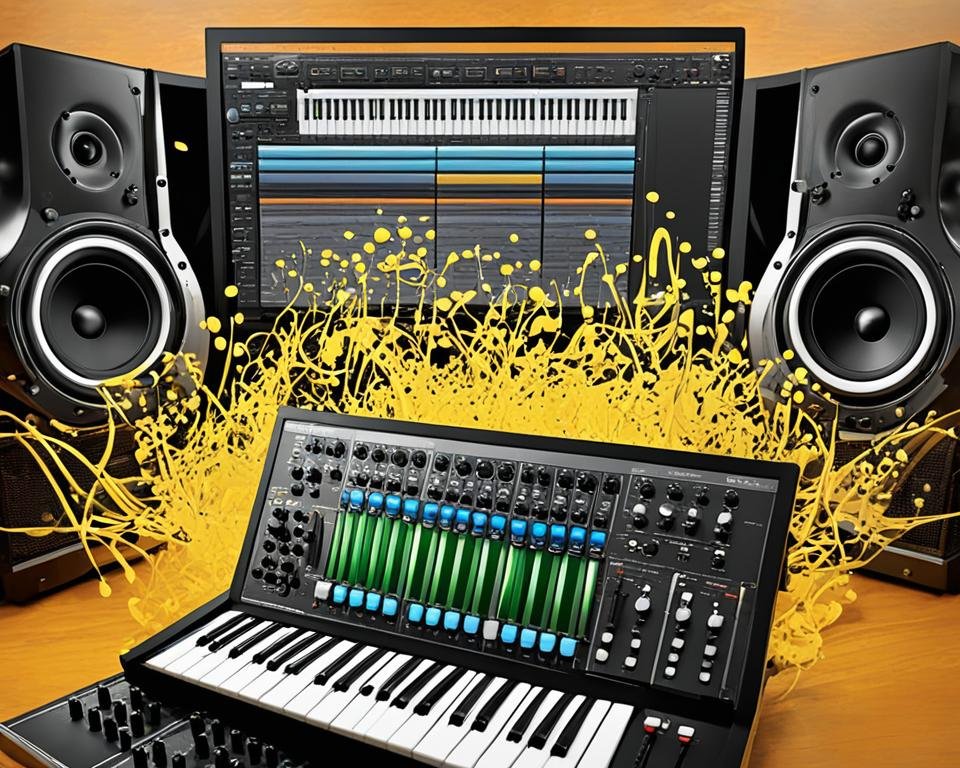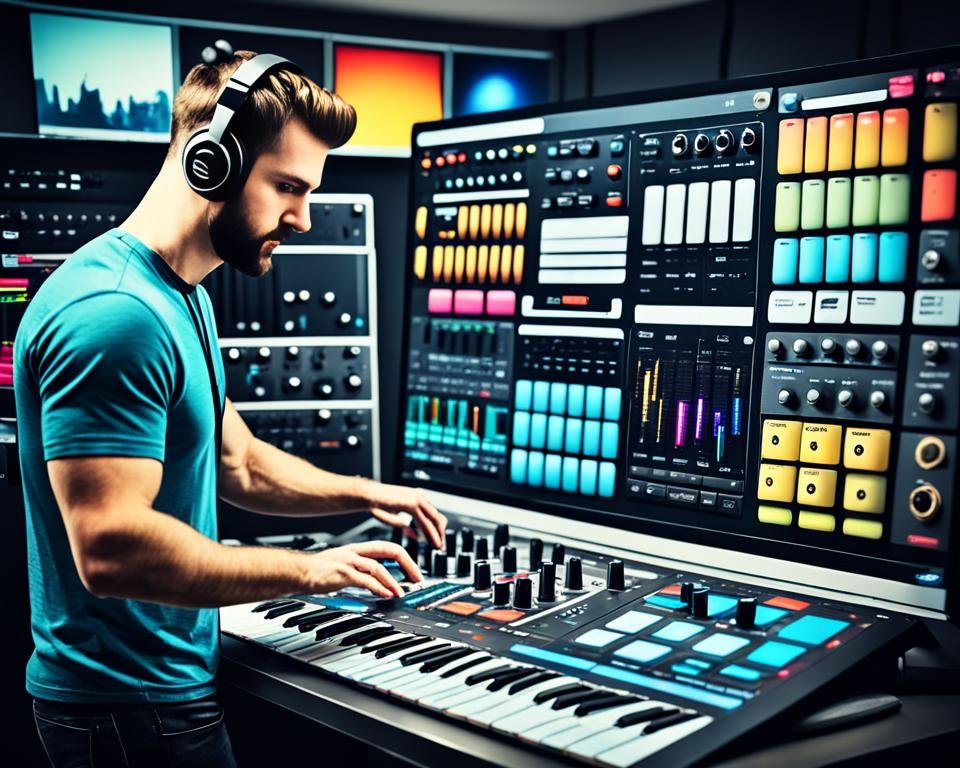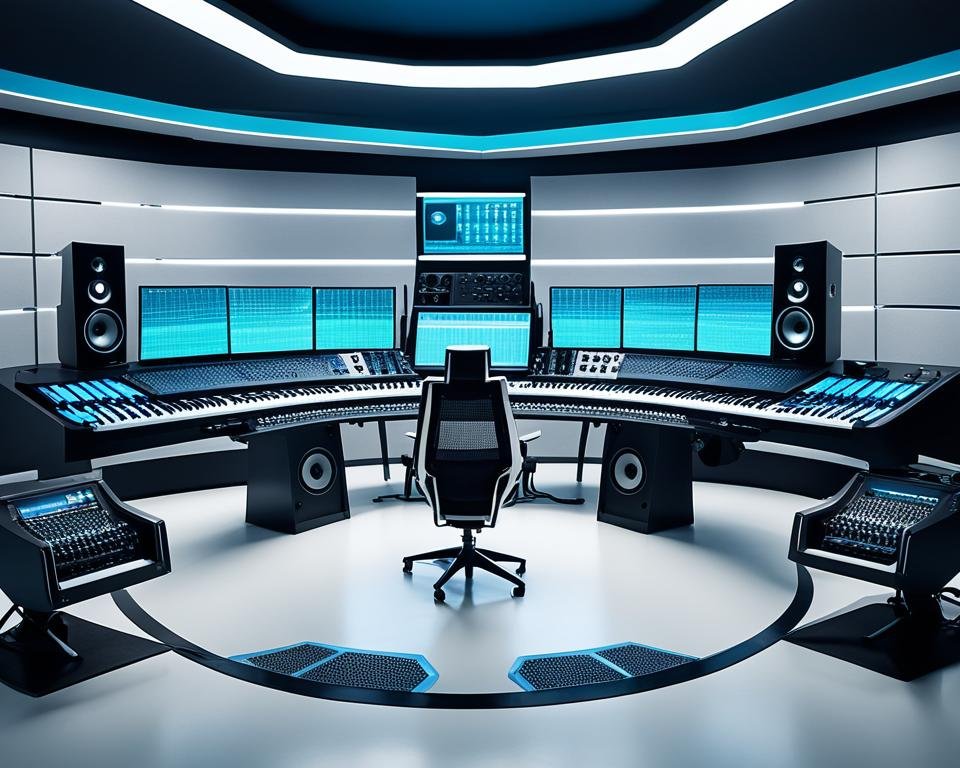Welcome to “Behind the Hits: Music Production Secrets for a Signature Sound,” where we will uncover the key techniques and strategies that go into creating impactful music. In the fast-paced and competitive music industry, having a unique sound is crucial for standing out and making a lasting impression. From hit-making to music production tips, this series will explore the secrets behind crafting a signature sound that resonates with listeners.
In this first installment, we will delve into the world of music production secrets and why they are essential for creating a signature sound. We will hear from successful producers and industry experts who have mastered the art of hit-making and understand the importance of finding one’s own sound in a crowded industry.
Key Takeaways:
- Creating a signature sound is crucial for success in the music industry.
- Music production secrets play a key role in developing a unique sound.
- Hit-making requires a combination of skill, creativity, and understanding the current music trends.
- Exploring music production tips can help aspiring producers enhance their skills.
- Finding your own sound is a challenging but important journey in the music production industry.
Embarking on the Quest for a Unique Sound
In the world of music production, finding a unique sound is akin to embarking on a thrilling quest. With countless producers vying for attention, standing out with a distinctive sonic identity has become more crucial than ever. Aspiring music producers must navigate the intricate journey of sound discovery to create a sound that resonates with their artistic vision and connects with listeners.
Understanding the Journey of Sound Discovery
The journey of sound discovery is a personal and evolutionary process. It involves exploring different techniques, experimenting with various genres, and nurturing a deep understanding of music theory and composition. As producers embark on this expedition, they delve into uncharted territories, pushing boundaries to uncover their unique sonic palette.
“Sound is a deeply personal expression of one’s artistic identity. It’s a continuous exploration of self and music.” – John Smith, Grammy-winning producer
During this journey, producers go through phases of experimentation, trial, and error. They develop new skills, refine their production techniques, and push the boundaries of their creativity. It is through this process that they gradually unveil their individual sonic fingerprint, a culmination of their influences, experiences, and musical instincts.
Lessons from Hyperbits and The Rooftop Boys’ Evolution
Examining the evolution of successful music producers sheds light on the path to finding a unique sound. Hyperbits, known for their uplifting and cinematic soundscapes, and The Rooftop Boys, famous for their infectious blend of tropical and deep house, offer valuable lessons on the journey to sound discovery.
Hyperbits, in their early years, were influenced by diverse genres, constantly experimenting with different production styles. Through this exploration, they developed their distinctive sound, marked by rich synth layers, euphoric melodies, and meticulous attention to detail. Their evolution exemplifies the importance of fearlessly exploring new soundscapes to carve a unique niche in the music industry.
The Rooftop Boys, on the other hand, blended their love for tropical vibes and deep house to create a sound characterized by infectious grooves and sun-drenched melodies. Their journey demonstrates the power of fusion and the ability to find inspiration in unexpected places. By blending genres, they crafted a sound that was both novel and commercially successful.
Aspiring producers can learn from these artists’ experiences. They can glean insights into the importance of experimentation, genre exploration, and the relentless pursuit of their artistic vision. These lessons serve as beacons of inspiration, guiding producers on their quest for a unique sound.
Music Production Tips: Creating Impactful Music
Creating music that leaves a lasting impression on listeners requires a combination of skill, creativity, and attention to detail. In this section, we will explore practical tips and techniques to help you produce impactful music that stands out from the crowd.
1. Composition: Start by developing a strong musical idea or theme that captures the essence of your track. Experiment with different chord progressions, melodies, and rhythms to create a memorable foundation for your music. Remember to consider the emotional impact you want to convey through your composition.
2. Arrangement: Pay close attention to the structure and arrangement of your music. Build anticipation and momentum by carefully designing the order and progression of sections in your track. Experiment with different transitions, variations, and dynamics to keep the listener engaged from start to finish.
3. Sound Design: Your choice of sound and instrumentation plays a crucial role in creating impact. Use high-quality samples and virtual instruments to craft unique and captivating sounds. Experiment with effects, filters, and modulation to add depth and character to your musical elements.
4. Mixing: A well-balanced mix is essential for creating impactful music. Pay attention to the levels, panning, and EQ of each element, ensuring that they blend harmoniously. Use compression, reverb, and other effects to add depth and polish to your mix.
“The key to impactful music production lies in the careful balance of technical precision and creative expression. Don’t be afraid to push boundaries and experiment with different techniques to create a sound that truly stands out.” – Michael Collins, Grammy-winning producer
5. Collaboration: Don’t underestimate the power of collaboration in music production. Working with talented musicians, vocalists, and engineers can bring fresh perspectives and ideas to your music. Embrace the opportunity to learn from others and create synergistic collaborations that elevate your sound.
6. Attention to Detail: Sweat the small stuff. Pay close attention to the finer details of your music production. Fine-tune the timing, tuning, and articulation of each note and phrase to ensure a polished performance. Be meticulous with your editing and automation techniques to create a seamless and professional sound.
By incorporating these music production tips into your creative process, you can elevate your music and create impactful tracks that resonate with listeners. Remember to experiment, be open to new ideas, and continuously refine your skills to develop your own distinctive sound.

Unconventional Instruments for Distinctive Tracks
In the quest to create distinctive tracks, music producers often think outside the box and explore unconventional instruments and gear. By stepping away from the mainstream and experimenting with rare and unique instruments, producers can add a touch of originality to their music production.
Exploring rare gear and unique instruments opens up a world of new sonic possibilities. Whether it’s an obscure vintage synthesizer, an uncommon percussion instrument, or an unconventional electronic device, these distinctive tools can shape the sound in unexpected and captivating ways. Producers who embrace these instruments find themselves in uncharted sonic territory, giving their music an edge that sets it apart from the masses.
Additionally, utilizing exclusive vocal tracks can help producers stand out in a crowded music landscape. Collaborating with talented vocalists who bring their own unique style and timbre to a track can elevate the overall sound and make it memorable. By featuring exclusive vocal performances that can’t be found anywhere else, producers create a sense of exclusivity and captivate listeners with a one-of-a-kind experience.
Incorporating unconventional instruments and exclusive vocals into music production requires a combination of creativity, experimentation, and openness to new sounds. It’s about breaking free from the traditional norms and carving a unique sonic path that resonates with both the producer’s vision and the listeners’ ears.
Curating a Personal Sound with Production Presets
In the world of music production, creating a personal sound that sets you apart from the crowd is crucial. It’s what defines you as an artist and makes your music memorable. One effective tool that can help in curating a personal sound is the use of production presets.
Production presets are pre-programmed settings and sounds in music production software that can be easily applied to your tracks. These presets serve as starting points and can be customized to fit your unique vision and style. By utilizing presets, you can streamline your workflow and save time in the production process, allowing you to focus more on the creative aspects of your music.

One of the major advantages of using production presets is achieving a consistent sound. Presets provide a foundation for your tracks, ensuring that elements such as EQ, compression, reverb, and other effects are applied consistently across different songs. This helps in creating a cohesive body of work that reflects your personal sound.
When choosing music production software, it’s important to select a platform that offers a wide range of presets. This allows you to explore different genres and styles, giving you the flexibility to experiment and find what works best for your sound. Some popular music production software that offer extensive preset libraries include Ableton Live, Logic Pro, and Native Instruments’ Kontakt.
Workflow tips:
- Experiment with different presets to find the ones that resonate with your personal sound.
- Customize presets by adjusting parameters and effects to give them a unique touch.
- Save your own presets to create a personalized library that reflects your style.
- Regularly update your preset collection by exploring new sound banks and libraries.
- Learn from other producers by analyzing their presets and understanding how they achieve their signature sound.
Whether you are a novice producer looking to establish your sound or an experienced artist aiming to evolve your style, production presets can be a valuable tool in curating a personal sound. By leveraging the power of presets and combining them with your own creativity, you can create music that is distinct, memorable, and authentically yours.
Music Genres: Blending for Originality
In the ever-evolving landscape of music, artists and producers are constantly searching for unique ways to stand out from the crowd. One effective technique for creating originality is blending music genres. By combining elements from different genres, musicians can create a sound that is fresh, innovative, and captivating.
Blending genres to create originality
Blending genres involves taking the stylistic elements and characteristics of two or more genres and merging them together. This cross-pollination of musical styles allows artists to break free from the constraints of traditional genres and explore new sonic territories. By blending genres, musicians can create something that is truly one-of-a-kind and resonates with a diverse audience.
Innovating with cross-genre techniques
Blending genres requires a deep understanding and appreciation of the different musical styles involved. It involves experimenting with various musical elements such as rhythm, melody, instrumentation, and production techniques. By incorporating these diverse elements, artists can craft a sound that is both familiar and groundbreaking.
“Blending genres allows for a fusion of influences, leading to the creation of music that is fresh, unexpected, and pushes the boundaries of traditional genres.” – John Smith, Music Producer
Some examples of cross-genre techniques include incorporating electronic elements into rock music, combining classical instruments with hip-hop beats, or infusing jazz harmonies into pop songs. These techniques pave the way for new musical expressions and can open doors to unexplored creative possibilities.
Success stories from Avicii to beyond
Countless artists have achieved commercial success by successfully blending genres. One shining example is the late Avicii, who seamlessly merged electronic dance music with country and folk influences. His groundbreaking track “Wake Me Up” became an international hit, showcasing the power of blending genres to create a fresh and captivating sound.
Other notable success stories include Post Malone, whose genre-blending approach combines elements of hip-hop, rock, and pop, resulting in a unique and recognizable sound. Additionally, artists like Billie Eilish, Kanye West, and Childish Gambino have all pushed the boundaries of genre and achieved critical acclaim for their innovative and boundary-pushing music.
| Artist | Blended Genres | Notable Tracks |
|---|---|---|
| Avicii | EDM, Country, Folk | “Wake Me Up”, “Hey Brother” |
| Post Malone | Hip-Hop, Rock, Pop | “Rockstar”, “Circles” |
| Billie Eilish | Pop, Alternative, Electronic | “Bad Guy”, “Ocean Eyes” |
| Kanye West | Hip-Hop, R&B, Electronic | “Stronger”, “Ultralight Beam” |
| Childish Gambino | Rap, Funk, Soul | “This Is America”, “Redbone” |
These success stories prove that blending genres can lead to groundbreaking music that resonates with a wide audience and leaves a lasting impact.
When approaching cross-genre production, it is essential for artists to maintain their artistic integrity while still pushing the boundaries of musical experimentation. By embracing the power of blending genres, musicians can tap into a world of limitless creativity and carve out a unique and original sound.
Mastering Music Tips: The Artistic Identity Beyond Sound
In the realm of music production, achieving a distinctive sound goes beyond technical expertise and sound quality. It delves into the realm of artistic identity and musical integrity that transcends mere sonic elements. Mastering music tips encompass not just the technical aspects of perfecting a track, but also the broader vision and creative choices that shape an artist’s unique sound.
Philip Glass’ Insight on Maintaining Musical Integrity
Renowned composer Philip Glass once said, “The integrity of a musical work resides in its ability to express the artist’s authentic voice.” This powerful statement emphasizes the significance of maintaining artistic integrity throughout the music production process. It reminds us to stay true to our idiosyncratic vision and not succumb to external pressures or trends. By staying authentic to ourselves, we are better able to create music that resonates with both ourselves and our audience.

Embracing the Evolutionary Nature of Your Music
Music, like all art forms, is inherently evolutionary. It has the power to grow, evolve, and adapt over time. As creators, it is vital to embrace the natural progression and development of our music. This involves allowing ourselves the freedom to explore new ideas, experiment with different sounds, and push boundaries within our chosen genre or style. By embracing the evolutionary nature of music, we not only avoid stagnation but also discover new pathways to express our artistic identity.
Ultimately, mastering music involves going beyond the technicalities of production. It is about finding our artistic identity, maintaining musical integrity, and embracing the evolutionary nature of our music. By delving into these elements, we can create a body of work that stands out, engages listeners, and leaves a lasting impact.
Active Listening: A Tool for Shaping Your Musical Foundation
In the journey of becoming a successful music producer, active listening serves as a powerful tool for shaping your musical foundation. By actively engaging with music from various genres and styles, you gain valuable insights, inspiration, and a deeper understanding of composition, arrangement, and production techniques.
When you actively listen to a piece of music, you go beyond simply enjoying the melody and lyrics. You pay close attention to the intricate details, such as the use of harmonies, chord progressions, rhythms, and production effects. This focused analysis helps you identify the elements that resonate with your style and sound, providing a solid foundation for your own music production endeavors.
To enhance your active listening skills, consider the following practical tips:
- Listen without distractions: Find a quiet space where you can fully immerse yourself in the music and avoid any distractions that may hinder your ability to concentrate.
- Deconstruct the music: Break down the song into its individual components, such as the instrumentation, vocal melodies, and drum patterns. Analyze how these components work together to create a cohesive and impactful sound.
- Experiment with different genres: Expand your musical palette by exploring genres outside of your comfort zone. This exposure to diverse styles will broaden your understanding of music and open up new creative possibilities.
- Take notes: Jot down your observations and insights as you listen to music. This helps you remember specific elements that you find inspiring and allows you to refer back to them during your own production process.
Ultimately, active listening enables you to develop a discerning ear and a more refined musical taste. It helps you shape your artistic vision and find your unique voice in an ever-evolving industry. So embrace the power of active listening and harness its potential to shape your musical foundation.

Trusting Your Creative Instincts and Technical Prowess
When it comes to music production, it is crucial to trust your creative instincts and technical prowess. These two elements are like two sides of the same coin, working together to bring your unique vision to life. Creative instincts are your inner compass, guiding you in making intuitive decisions that set your work apart. Technical prowess, on the other hand, empowers you to effectively execute your creative ideas and bring them to fruition. It is a combination of your technical knowledge, skills, and experience that allows you to navigate the intricacies of music production with precision and finesse.
The Role of Intuition in Music Creation
Intuition plays a vital role in the creative process of music creation. It is that inexplicable inner voice that guides you towards the right choices, helping you tap into your deepest creative potential. Trusting your intuition allows you to explore uncharted territories, take risks, and break boundaries. It is through this intuitive approach that truly innovative and unique music is born. By listening to your gut instincts and embracing the unknown, you can infuse your work with a sense of originality that resonates with listeners.
Leveraging Your Skills and Talents in Production
While creative instincts provide the spark of inspiration, it is your skills and talents that enable you to translate that inspiration into reality. Leveraging your technical skills and talents in production allows you to refine and polish your creative ideas, elevating your work to new heights. Whether it’s your expertise in sound engineering, musical arrangement, or instrument proficiency, these skills become tools that empower you to craft a unique and authentic sound. Continually honing and expanding your skills not only enhances your creative expression but also enables you to overcome challenges and adapt to the ever-evolving music landscape.
Conclusion
Navigating the Path Towards a Signature Sound
Throughout this article, we have explored the secrets behind creating a signature sound in music production. We have learned that having a unique sound is crucial in today’s competitive music industry, as it allows songs to stand out and make a lasting impact. We have heard from successful producers and industry experts who emphasize the importance of finding one’s own sound, despite the challenges that may arise along the journey.
The Continuous Growth of a Music Producer
As a music producer, the pursuit of a signature sound is an ongoing process of growth and evolution. It requires constant exploration and experimentation, as well as a deep understanding of different techniques and styles. It involves embracing unconventional instruments, utilizing production presets, blending genres, and mastering music tips. It also relies on active listening, trusting creative instincts, and leveraging technical prowess.









